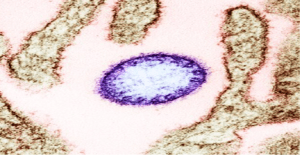6th Nipah Virus Outbreak in Kerala: 24-Year-Old Student Dies, 175 People Identified as Contacts
Nipah virus resurfaces in Kerala for the sixth time since 2018. A 24-year-old student dies from the virus, prompting authorities to intensify containment efforts. 175 people who had contact with the victim have been identified, and the state is taking measures to prevent further spread.
CONTENTS:

6th Nipah Virus Outbreak in Kerala
Nipah virus resurfaces in Kerala.
A 24-year-old student from Malappuram district, Kerala, tragically passed away on September 9th due to the Nipah virus, which has resurfaced in the state. This is the sixth outbreak since 2018, occurring alongside the Onam festival, now clouded by rising concerns over the deadly virus. Health authorities, working to curb the spread, have identified 175 people who had contact with the victim and have intensified containment efforts in the district, according to ANI.
A report by India Today reveals that the 24-year-old man who died from the Nipah virus was a student who had returned home to Kerala from Bengaluru at the end of last month to receive treatment for a leg injury. He sought care at four different hospitals before a private hospital raised concerns about his symptoms and alerted the state health department, suspecting a Nipah infection. Kerala has since been taking significant steps to prevent further spread of the virus.
Nipah virus confirmed in Kerala.
6th Nipah Virus Outbreak in Kerala According to the World Health Organization (WHO), the early symptoms of Nipah virus in humans include fever, headaches, muscle pain, vomiting, and sore throat. These symptoms can escalate to dizziness, drowsiness, altered consciousness, and neurological issues that indicate acute encephalitis. Some individuals may also develop atypical pneumonia and severe respiratory conditions, such as acute respiratory distress. With a fatality rate ranging from 40% to 75% and no available cure, the zoonotic virus poses a significant threat.
Following the student’s death, his swab samples were tested in Kozhikode on September 16th, confirming the presence of Nipah virus, with results further verified by the National Institute of Virology in Pune.
Kerala intensifies Nipah prevention efforts.
6th Nipah Virus Outbreak in Kerala In response to the confirmed case, health authorities in Kerala have swiftly implemented measures to prevent further spread of the virus. Kerala Health Minister Veena George told India Today that 175 individuals in Malappuram district who had contact with the deceased have been identified, including 74 healthcare workers. Of these, 104 people are considered high-risk, with 10 quarantined at Manjeri Medical College Hospital and samples from 13 sent for testing. Additionally, 16 of the student’s college friends, who attended his funeral, have been advised to self-isolate as a precaution.
Nipah virus declared zoonotic.
6th Nipah Virus Outbreak in Kerala The World Health Organization identifies the Nipah virus as a zoonotic virus, meaning it spreads from animals to humans and can also be transmitted through contaminated food or direct human contact. Fruit bats are the primary carriers, and humans can contract the virus by consuming bat-contaminated fruits or coming into contact with the bats’ bodily fluids, such as saliva or urine.
To control the spread, Kerala’s health minister has declared five wards in Malappuram as containment zones and started conducting household surveys. Masks are now mandatory in the district, and social gatherings have been restricted.
Kerala imposes Nipah restrictions.
6th Nipah Virus Outbreak in Kerala Shops in the containment zones are required to close by 7 PM, and public spaces such as cinema halls, schools, colleges, madrassas, anganwadis, and tuition centers have been temporarily closed to avoid crowding. According to M. Rajagopalan, a local CPI(M) leader from Thiruvali in Malappuram, the situation is currently under control with no new cases reported from the area. Authorities are maintaining close surveillance and advising people to wear masks, as reported by India Today.
Nipah virus frequently resurfaces in Kerala.
6th Nipah Virus Outbreak in Kerala Kerala’s first Nipah virus outbreak occurred in 2018 in Kozhikode district, where 17 out of 18 infected individuals died. Since then, the state has faced multiple outbreaks. In June 2019, a 23-year-old student in Ernakulam contracted Nipah, and in September 2021, a 12-year-old boy in Kozhikode died from the virus. In 2023, there were two outbreaks in Kozhikode, resulting in six cases and two deaths.
This recent outbreak marks the sixth instance of Nipah virus reemergence in Kerala since 2018, with Kozhikode and Malappuram districts being the most affected. Since May 2018, the infection has claimed 17 lives in Kozhikode alone.
A Reuters investigation highlighted that rapid urbanization and deforestation in Kerala have created conditions conducive to the virus’s emergence. Pragya Yadav, lead scientist on Nipah research at Pune’s National Institute of Virology (NIV), noted that habitat loss has increased contact between animals and human populations, facilitating the virus’s transmission from bats to humans.
Dr. Yadav pointed out that two main factors contribute to Nipah’s recurrence in Kerala: the proximity of human settlements to forests and improved surveillance efforts. In states along the Western Ghats, human habitations are often near or within forests, raising the risk of exposure to infected animals. In contrast, northern India’s forested areas are generally farther from human settlements.
The World Health Organization (WHO) advises avoiding close, unprotected contact with Nipah-infected individuals and emphasizes regular handwashing after interacting with sick people.
Check out TimesWordle.com for all the latest news
You must be logged in to post a comment.